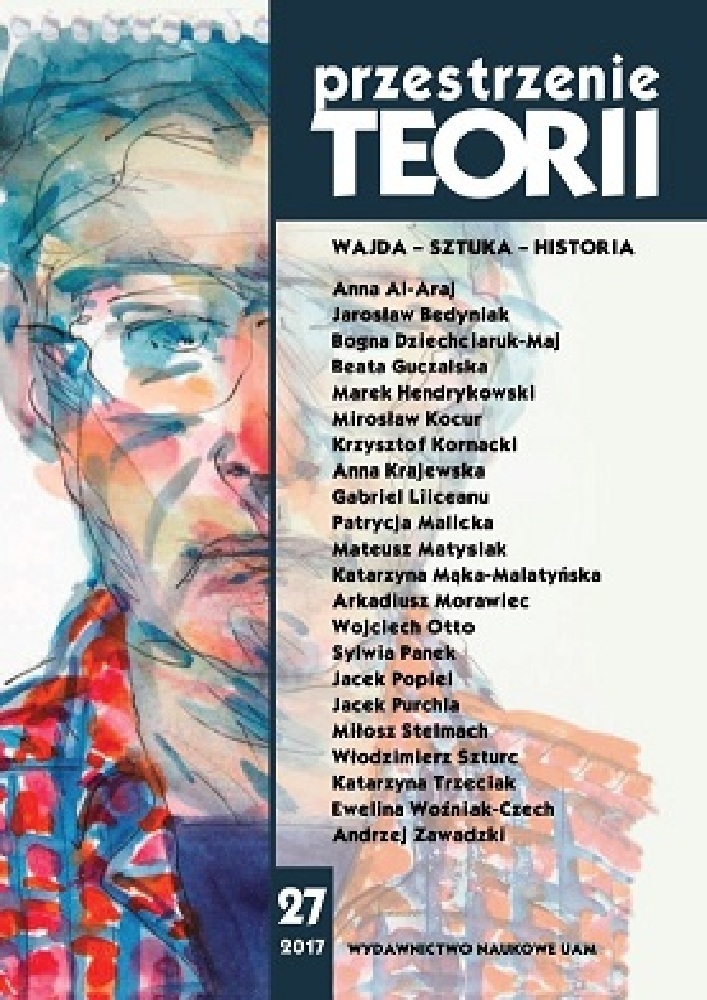Abstrakt
The aim of the article is to place Andrzej Wajda’s work from the early 1970s in the late-moderist trend developing in Polish film at that time. The best example of this is The Wedding (1972), which implements modernist strategies of subjectification, self-reflection and stylisation at the artistic and narrative level. The presence of ghosts in this film especially leads to a theoretical discussion on the spectral nature of the medium of film.
Bibliografia
Cinematic Ghosts. Haunting and Spectrality from Silent Cinema to the Digital Era, ed. M. Leeder, New York–London 2015.
Janion M., Egzystencje ludzi i duchów. Rodowód wyobraźni filmowej Andrzeja Wajdy, [w:] M. Janion, Projekt krytyki fantazmatycznej. Szkice o egzystencjach ludzi i duchów, Warszawa 1991.
Kermode F., Znaczenie końca, przeł. O. Kubińska, W. Kubiński, Gdańsk 2010.
Kovács A.B., Screening Modernism. European Art Cinema 1950–1980, Chicago–London 2007.
Lubelski T., Historia niebyła kina PRL, Kraków 2012.
Lubelski T., Wajda. Portret mistrza w kilku odsłonach, Wrocław 2006.
Perez G., The Material Ghost. Films and their Medium, Baltimore–London 1998.
Petit Ch., Wnętrza. Postkino i kino utracone, tłum. M. Stelmach, „Ekrany” 2014, nr 2.
Słonimski A., Wesele, „Tygodnik Powszechny” 1973, 25 II.
Szeligowska N., Guy Maddin i duchy minionego kina, „EKRANy” 2015, nr 6.
Wajda A., Zaklinacz duchów, rozmowę przeprowadził J. Żakowski, „Film” 2007, nr 9.
Licencja
Autorzy
Autorzy tekstów przyjętych do publikacji w czasopiśmie „Przestrzeniach Teorii” są zobowiązani do wypełnienia, podpisania i odesłania na adres redakcji umowy o udzielenie nieodpłatnej licencji do utworów, z zobowiązaniem do udzielania sublicencji CC.
Zgodnie z umową, autorzy tekstów opublikowanych w czasopiśmie „Przestrzeniach Teorii” udzielają Uniwersytetowi im. Adama Mickiewicza w Poznaniu niewyłącznej i nieodpłatnej licencji oraz zezwalą na użycie sublicencji Creative Commons Attribution-NonCommercial-NoDerivatives 4.0 International (CC BY-NC-ND 4.0).
Autorzy zachowują prawa do dalszego, swobodnego rozporządzania utworem.
Autorzy, którzy wykorzystują w swoim tekście cudze utwory (np. ilustracje, fotografie) proszeni są o dostarczenie do redakcji czasopisma zgodę na publikację od uprawnionych podmiotów.
Użytkownicy
Zainteresowani użytkownicy internetu uprawnieni są do korzystania z utworów opublikowanych po 2015 roku „Przestrzeniach Teorii” tylko w calach niekomercyjnych, pod następującymi warunkami:
- uznanie autorstwa - obowiązek podania wraz z rozpowszechnionym utworem, informacji, o autorstwie, tytule, źródle (odnośniki do oryginalnego utworu, DOI) oraz samej licencji;
- bez tworzenia utworów zależnych - utwór musi być zachowany w oryginalnej postaci, nie można bez zgody twórcy rozpowszechniać np. tłumaczeń, opracowań.
Do wszystkich tekstów opublikowanych przed 2015 r. prawa autorskie są zastrzeżone.
Inne
Uniwersytet im. Adama Mickiewicza w Poznaniu zachowuje prawo do czasopisma jako całości (układ, forma graficzna, tytuł, projekt okładki, logo itp.).
